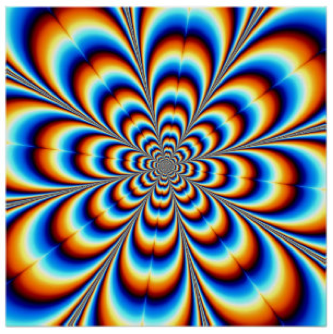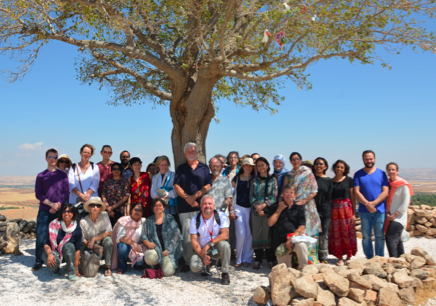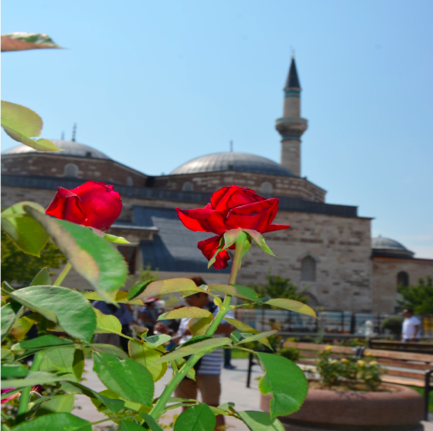 Tazeen Ahmad
Tazeen Ahmad
In the name of God, the Infinitely Compassionate, Most Merciful,
I dedicate this letter to the 33 prayer beads who journeyed with this one on the tekkye bus to ancient lands, who helped trigger some nafs attacks and to dearest Kabir Dede and Camille Ana, without whom this journey would not have been possible.
Dearest Dost,
Rumi, says, “Your task is not to seek for love, but merely to seek and find all the barriers within yourself that you have built against it.”
“Nafs” in arabic means self or ego. Shaikh Kabir in Living Presence says, “An unrefined nafs is the lowest dimension of man’s inward existence.” Our nafs can therefore be seen as the biggest veiler of Truth. A nafs attack can be described as a triggered emotional response to a previously internally processed experience, which hijacks us emotionally and mentally, making it difficult to discern our egoism from our true self. During a nafs attack you turn away from remembrance of Allah and your ability to be present suffers as it feeds the ego perpetuating our own illusion of separateness from Divine reality, creating distorted behaviours away from our essential self.
A nafs attack is simply part of every human’s inner struggle. How we integrate the duality of our human reactions with our essential self is part of our human journey.
Let me begin with a personal journey of my very own nafs attack. It occurred during a recent trip to Turkey with a beautiful spiritual family of seekers. During the trip, I suddenly found myself emotionally triggered with a familiar inner dialogue of resentment and pride running through my brain. Physiologically, I noticed my breathing was shallower and my stomach was knotted. In brief, the story dominating me was based on an inner judgment towards another and how their behaviour was impacting me emotionally in a negative way. With this self-perpetuated story, I was justified in my own self-pity. At the time, the story felt real, it was “my” truth, causing me deep wounding and pain. I was struggling to let go of it and I recall wanting to separate from people around me. The last thing I felt like doing was praying. My back was turned away from Divine mercy and compassion at a time when I needed them most.
The sadness and anger that I experienced during my nafs attack kept my heart in a state of unease. I decided to go for a jog and try to change my physical state. I found myself at Sham’s mosque only to discover it was closed. In the park outside, I witnessed a child hitting another child, and then a mother coming to hit the child that hit the first child. Then a father came over to beat the mother who hit the child that hit the first child. The absurdity of what I was witnessing, jolted something in my system. I was physically witnessing nafs attacks everywhere!
The following morning, I took myself to the sweetness of Mevlana’s presence. There the anger and resentment being experienced during my nafs attack gave way to intense physical pain in my chest and heart. Moments later, I found myself weeping. The floodgates of my heart had opened and felt wrenched into a billion pieces. The pain cut so deep that the clouds of my heart rained for an entire afternoon. Midst this grief stricken sob, my heart suddenly became still and I myself turning to Allah in dhikr. Shaikh Kabir Helminski says, “The clear heart is the best guide to living. The state of positive emptiness, equanimity, and peace is a kind of zero state, an emptiness that is a plenum of abundance.” In the presence of Mevlana, in those tender moments post the inner washing that had taken place, a deep emptying had taken place. With the emptying, I experienced a real inner calm and peace. It was like sitting in the eye of a storm in which my heart was filled with nothing but the love of God.
I felt lighter, opened my eyes and at that exact moment, a complete stranger stood up and gave me a small stone as a gift. I then moved to the heavenly gardens at Mevlana’s and became intoxicated with the roses there.
Reflecting amongst the roses, I realised how during a nafs attack we forget God, and are dancing far away from the embrace of the infinite love that is always present. Instead we draw ourselves deeper into the state of separation and end up focusing on the scratchiness of our thorns and forget the intoxicating perfume and beauty of our own rose-ness nestled amongst thorns.
Rumi says, “The rose’s rarest essence lives in the thorns.” Certainly, in the eye of the emotional storm, after the emptying, the fragrance experienced was heavenly. In fact, the Nafs attack is potentially the exact moment in which the boiling of our own chickpea-ness can reach melting point and diffuse into our Beloved. They are our soul’s growth edges should we choose to trust and surrender to Allah when experiencing them. A nafs attack can start the awareness of the veils of separation and can begin the healing process and improve personal integration with the Divine.
In my own nafs attack, the veil was lifted on how behind the triggered emotions of resentment and pride lay this deep longing of simply wanting to feel included, appreciated, accepted and ultimately loved. To have the nafs and essential self integrated through love so that I am you and you are me and together the nafs and the nur sitting in each of us becomes we, reminds me of Rumi’s saying:
“With the Beloved’s water of life no illness remains.
In the Beloved’s rose garden of union, no thorn remains.
They say there is a window from one heart to another
How can there be a window where no wall remains?
Before embarking upon our Turkey retreat, I attended the Threshold UK retreat, “The never ending search for Truth.” Could this also be “These never ending nafs attacks”?
Our play acted out emotions of envy, resentment and pride – the most common triggers behind nafs attacks, really veil the pain of our separation from our Beloved. Underlying these emotional distortions are our deep longing to be loved, appreciated and experienced in presence by another.
During the nafs attack, we embody “La Illaha” (There is no God). Once we surrender and remember “il Allah”, only then can we heal our pain and rejoice in all that is Allah.
Moving towards Truth requires courage, as the imagined suffering when we risk being vulnerable can keep us in fear even though the suffering we incur with our heart coverings is worse.
Perhaps when our nafs attack next causes separation between us and our Beloved, we may choose to step into our consciousness and lift our inner veils to follow the “siratull mustaqee, — the straight path by recalling this prayer of truth to our hearts.”
Oh God Help us see truth as truth and bestow upon us the blessing of following it.
Oh God help us to see falsehood as falsehood and bestow upon us the blessing of avoiding it.
And let us not be confused as to lead us astray
And make us for the God conscious an example.
If our beloved prophet was a servant of God, we can ask of ourselves, what am I choosing to serve when we next experience a nafs attack? Can we open up to the mercy sitting within a nafs attack and will we choose to heal our internally processed experiences with the choices we make during a nafs attack?
The adab (courtesy, respect & appropriateness) during a nafs attack is to simply keep turning to God. Perhaps we choose to begin with ablution, to allow the healing effect of water to wash away our triggered state. Maybe we take ourselves into prostration and surrender the pain to dhikr Allah, until Allah provides an emergence from within. We can but pray with sincerity and wait, asking for God’s forgiveness as none of us are without sin when we enter these human bodies. We may choose during our nafs attack to focus more than ever on what and how we say things. When triggered, can we remember to use the language of abundance and love? Finally, can we do an act of service during the nafs attack? Prophet Muhammad said, “None of you will have authentic faith until your hearts are made right, nor will your hearts be made right until your tongues be made right, nor will your tongues be made right until your actions be made right.”
Through focusing on adab and service and with patience, forbearance, acceptance and true surrender and humility we can deepen our intoxication with the perfume lying within the thorns.
What greater mercy can there be for us, through the self examination offered in a nafs attack?.
Greater awareness and personal integration will manifest (according to Shazreh Hussain, a fellow dervish on the tekkye bus,) by “Turning…turning to the Beloved in all states… one day, the nafs will fall unconscious…”
Shaikh Kabir says, “What is unreal will fall away in the presence of what is Real. The discipline that is required is the discipline of faithfulness to this truth, of being true to our yearning.“
In every triggered emotional experience can we cling to the rope of God and remember the following prayer from the Mevlevi Wird:
I have readied the following words: facing all fears, “There is no God but God;” facing all sorrows and sadness, “May it be as God wills;”facing all benefits, “Praise be to God;” and facing all abundance, “Thanks be to God;” and facing all astonishment, “God is subtle beyond all knowing;” facing all sins, “I ask God’s forgiveness;” facing all scarcities, “Allah is enough for me;” facing all calamities, “We belong to God and to Him we shall return;” facing every event of destiny, “ I trust in God;” facing all obedience, “There is no means or power in anyone except through God who is the Most High, the Most Great.”
Walking in the footsteps of Abraham with my fellow 33 prayer beads. I realised a nafs attack takes us away from “TawakkalAllah” and signals our deepest longings, shedding light on what our soul needs to work on. They help us purify our heart, so I say ShukrAllah for my nafs attack and look forward to the next one.
The Thirty Three Prayer Beads of My Journey 


